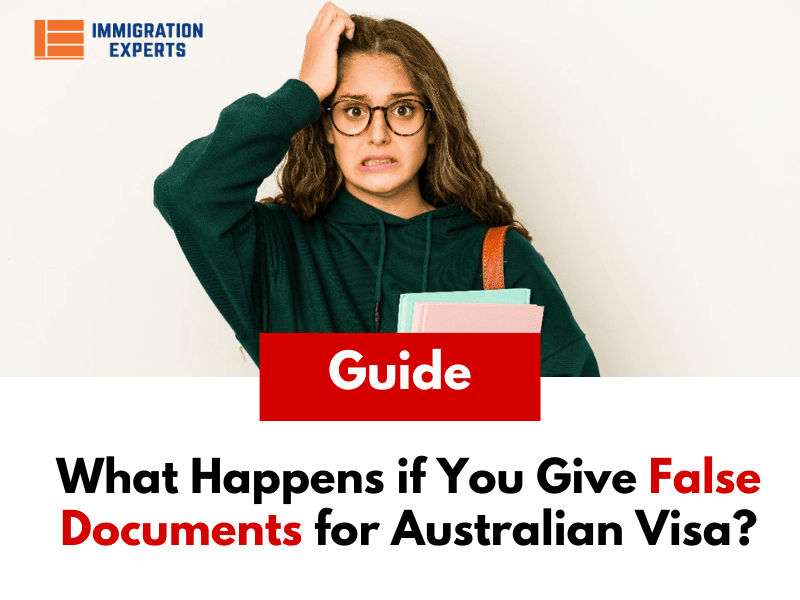051 8439995, 042 35911332

Are you planning to move to Australia by using fake or altered documents in your visa application? Take a look at this blog first!
After going through this blog post, you might reconsider your decision. The Australian Government has strict rules to keep the immigration system honest. Whether you’re applying for a work visa, a skilled visa, or a tourist visa, you need to be honest and straightforward.
Understanding Australia’s Public Interest Criterion 4020
An important part of Australia’s immigration policy, aimed at preventing visa fraud, is Public Interest Criterion 4020. It requires applicants to provide accurate information and genuine evidence. To ensure compliance with PIC 4020, the Department of Home Affairs thoroughly checks the information and documents provided by visa applicants.
If you don’t meet the visa requirements set by the Government, you could face serious consequences such as visa cancellation, hefty fines, and even imprisonment. Therefore, it’s essential to be cautious before applying for an Australian visa.
For more information on fake or altered documents and the consequences of submitting them for Australian visas, read this blog post. But before diving into the details, let’s first understand what constitutes a forged or fraudulent document.
What is a Misleading Document?
A bogus or forged document, as defined by the Migration Act 1958 (section 5), refers to any document that is false or fake. According to Section 5, forged documents can be:
- Documents that appear to be issued to a person but were not issued to them.
- Fake or altered documents created by someone who is not authorized to do so.
- Documents obtained by intentionally or unintentionally providing misleading information.

In visa applications, fraud can occur through different means. This includes:
- Presenting forged documents: Submitting documents that have been falsified or altered to misrepresent information.
- Providing misleading information: Furnishing incorrect or deceptive details with the intent to deceive immigration authorities.
- Intentionally concealing facts: Deliberately hiding relevant information that could affect the outcome of the visa application.
This encompasses situations where applicants or their representatives submit fake documents or provide misleading information to the Department of Home Affairs.
Take a glance at the table below to understand the distinction between a bogus document and misleading information:
| Forged Documents | Misleading Information |
| Identity documents | False statements |
| Work references | Omitting relevant information |
| University Qualifications | Fabrication or modification of facts |
| Advanced technologies assess forged documents. | Assessing misleading information involves analyzing background data. |
Visa Cancellation Due to Falsified Documentation
Here are some falsified documents that can lead to visa refusal in Australia:
- Providing incorrect information in Form 1263 for a Working Holiday Visa application.
- Making false statements about marital status to gain additional points for a skilled migration visa.
- Submitting fake work experience certificates.
- Presenting forged payslips related to employment.
- Altering identity information like name or passport details.
- Manipulating bank account details and statements.
- Submitting forged documents regarding university qualifications or skills.
If you include any of these bogus or forged documents with your visa application to the Department of Home Affairs, you’ll face serious consequences. Let’s delve into what happens if you provide forged documents for an Australian visa.
Consequences of Submitting Forged Documents

1. Visa Cancellation:
When applying for an Australian visa, submitting forged documents can have severe repercussions. Firstly, if any fraudulent or forged documents are detected in your application, your visa stands at risk of being canceled by the Australian Government. Additionally, if a family member submits a visa application with misleading or fraudulent documents, this could also negatively impact your visa application. Similarly, including bogus documents in your application might not only lead to the rejection of your current application but could also have long-term consequences. Future visa applications for your family members could be jeopardized due to the inclusion of fraudulent documents in your previous application. Moreover, if your visa application includes dependents and is found to have forged documents, visas may not be granted to them, complicating your family’s immigration plans. Furthermore, providing misleading information in your application could result in a ban preventing your entry into Australia for a substantial period, lasting up to three years.
Current Visa Holders:
For those already holding an Australian visa, the discovery of fraudulent documentation post-entry could have serious ramifications. In such cases, the Department of Home Affairs may opt to cancel your visa, potentially leading to deportation from the country. However, it’s essential to note that under specific circumstances, you might still have the opportunity to apply for another visa, albeit from outside Australia. These consequences underscore the critical importance of maintaining honesty and integrity throughout the visa application process, as any attempt to deceive immigration authorities can have significant and lasting repercussions.
How Do You Proceed If Your Visa Is Rejected?
Upon discovering forged documents in your visa application, the Department of Home Affairs will inform you through a notification letter. This letter will provide a 28-day window for you to respond and address the situation. It’s important to note that if the case officer uncovers false information and you’re unable to substantiate it with valid evidence, the Department may request you to appeal the evaluation of the decision by the Migration Review Tribunal (MRT).
For those encountering visa cancellation or refusal by the Australian Government, or those who have received a Notice of Intention to Consider Cancellation, assistance is available. You can reach out to The Migration for support. We can aid you in discussing your case with the tribunal or court, or in submitting an appeal to review the Government’s decision regarding visa cancellation.
In addition to potential visa cancellation, providing forged documents in your visa application can lead to other adverse consequences.
2. Legal Ramifications:
Committing immigration fraud in Australia is considered a criminal offense. Those found guilty of submitting false documents may face penalties and potential incarceration, depending on the severity of the fraud and individual case circumstances.
3. Damage to Credibility:
Participating in fraudulent activities tarnishes one’s credibility and reputation. Such actions not only affect the individual’s standing within the Australian community but also impact relationships within their home community.
4. Immigration Record:
Australian immigration authorities maintain records of individuals involved in fraudulent documentation. These records may be shared with other countries, influencing future visa applications to other nations.
5. Possibility of Deportation:
Individuals entering Australia with falsified documentation risk deportation if their fraudulent actions are uncovered. Deportation typically entails immediate departure from the country, often at the individual’s expense, and may result in a temporary ban on returning for a specified period.
Frequently Ask Questions
What to Do with Application Errors?
In case of errors on your application form, it’s important to notify the Department of Home Affairs promptly. Here’s how you can do it:
- Check the official ImmiAccount website to see if you can import your application.
- Complete Form 1023, titled Notification of Incorrect Answer, and send it via email to the relevant application processing department.
Which Factors Leading to Deportation in Australia?
Certain offenses can lead to deportation from Australia, including:
- Failing to pass the “good character” test.
- Not meeting visa requirements.
- Violating visa terms and conditions.
Entering the country through deception or misrepresentation.
